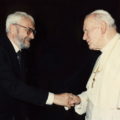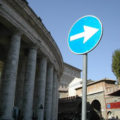I’m not going to say much about this; I wasn’t there, and ignored it as far as possible. The only footage I actually watched was on the Daily Show. But I do have a few items:
Early last week, I was riding the bus down to Lecco, at my usual time when it’s full of schoolkids. One girl was on her cellphone. “She only goes to mass ogni morte di papa!” she exclaimed, completely without irony, –nd now she wants to go to the funeral!”
Indeed, many of the Italians who traveled to Rome for the funeral probably don’t go regularly to Mass. I won’t presume to comment on why they went to the Pope’s funeral, except that Ross told me that some of her peers came back with cellphone photos of themselves drinking Limoncello (a strong lemon liqueur) in Piazza San Pietro.
I do know a number of serious Catholics – those who truly believe and practice Christianity, e.g., doing volunteer work. Interestingly, none of them went to Rome, and all were nonplussed by the outpouring of whatever this was, and disconcerted by the yells of “Santo subito!” (“Make him a saint immediately!”) As far as I know, it’s not in the church canons to saint somebody just because he was popular.
Rome rose magnificently to the occasion, managing to keep things in order and take care of the crush of people. Every cellphone in Italy received messages from the Protezione Civile (“Civil Protection” – the government emergency-response organization). The first read: “If you go to Rome to pay homage to the Pope, use mass transit and be prepared for organized but very long lines. Hot by day and cool at night. For information, listen to Isoradio [public information radio, mostly used for traffic warnings] 103.3.”
The second message said: “Due to enormous turnout, from Wednesday at 10 pm access is closed to the lines to salute the Pope. Friday for the funeral traffic will be stopped in Rome. The area of San Pietro is full. Large screens will be in the piazzas and at Torvergata” (an area outside Rome where the final rush of pilgrims was told to stop when the city couldn’t take any more).
My friend Alice Twain then sent her own message: “Protezione Civile: Before leaving for Rome, remember to turn off the gas, close the shutters, and water the plants.”
photo above: April 1, 2005 – the Papal Deathwatch. A TV transmission truck (belonging to RAI, Italian state television) parked outside the headquarters of Avvenire, Italy’s Catholic daily newspaper. The vultures are circling…







